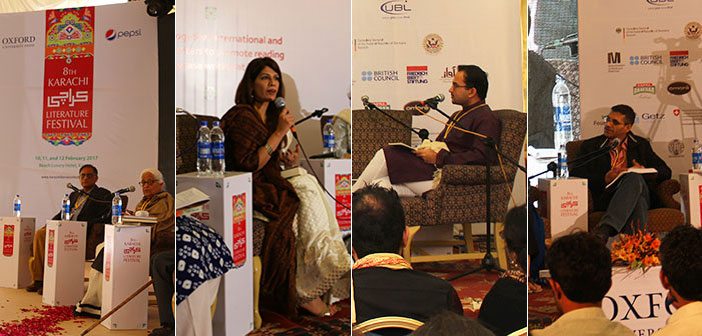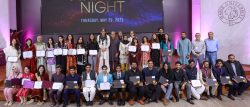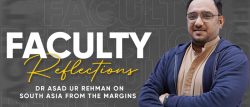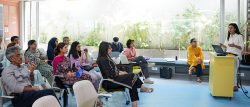Since its inception in March 2010, Karachi Literature Festival (KLF) has been one of the most coveted literary rendezvous for those who take delight in reading. Spanning across 75 engaging sessions and an interesting line up of 200 intellectual speakers/performers, the literary event was a three-day erudite celebration of prose and poetry being held from February 10 -12, 2017 at Beach Luxury Hotel, Karachi.
Bringing together a cohort of bibliophiles, inquisitive young minds, and word warriors from various spheres of life, the 8th Karachi Literature Festival presented sessions revolving around diversified ideas, creative masterpieces, and scholastic expressions depicted in the form of poetry performances, art exhibitions, book launches, and interactive talks. Some of the distinguished faculty members from Habib University were also a part of the stellar line up as panelists, moderators and speakers at the occasion.
Ageless Poetry and Graceful Wit
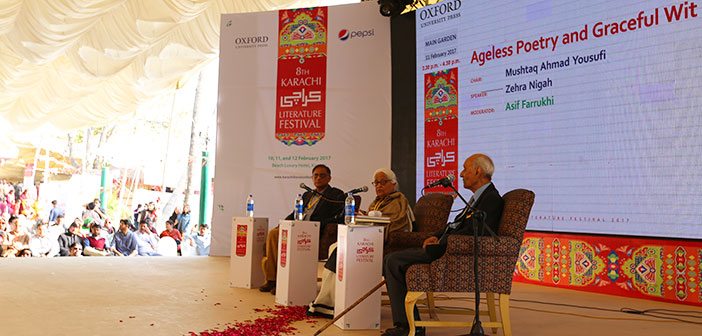
Dr. Asif Aslam Farrukhi (Left)
Interim Dean & Associate Professor at HU’s School of Arts, Humanities & Social Sciences, Dr. Asif Aslam Farrukhi, along with Zehra Nigah, led a hilarious and nostalgic session interviewing renowned and cherished writer and poet, Mushtaq Ahmed Yusufi. The hour long session was filled with anecdotes about the moderators’ time being spent with the author coupled with Yusufi’s ageless wit that kept the audience thoroughly entertained. Zehra Nigah recited a few of her favorite pieces from Yusufi’s collection followed by satirical remarks by the author himself.
Partition: Drawing Borders in Blood
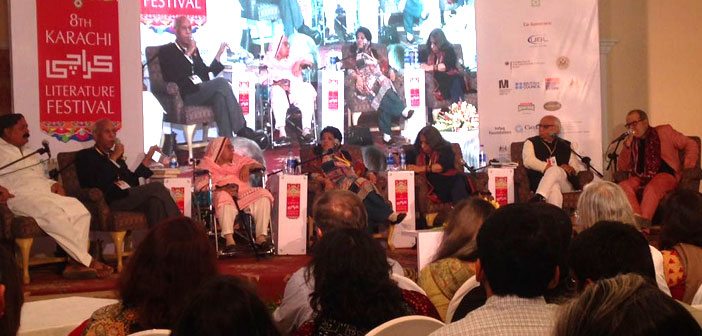
Dr. Nauman Naqvi (Right)
Dr. Nauman Naqvi, Director of the Liberal Core at HU, was the panelist in the session, which was moderated by Ishtiaq Ahmed, and also featured writer and co-founder of Kali for Women, Urvashi Butalia, renowned feminist poet, Kishwar Naheed, and chairperson of the Observer Research Foundation, Sudheendra Kulkarni.
The session touched on themes of historical trauma, critical memory work, and the importance of remembering individual histories, especially those histories of women, children, and Dalits that are often erased from official histories.
In his opening comments, Dr. Naqvi noted that, “Partition was a direct result of the apartheid nature of the colonial state,” and discussed how under colonial rule, religion became racialized.
On the topic of historical trauma, Dr. Naqvi discussed how Partition is often an unclaimed experience by the ordinary people who experienced it, and instead, remembered in our collective memory as the official state narrative. He observed, “Nationalism is a direct result of this narration and a lack of recollection.”
The panelists from both India and Pakistan discussed examples of individuals’ experiences and collectively agreed that we are responsible in recounting these stories and finding innovative solutions to build bridges between the two countries.
Bringing the Past into the Present
Moderated by Dr. Framji Minwalla, Program Director of Communication & Design at HU, and Dr. Syed Nomanul Haq, “Bringing the Past into the Present” was an interactive session with Ayesha Jalal as the main speaker. Speaking of her past works, she spoke to the audience about how ‘one writes different types of things at different stages in life,’ and discussed about her book on partition. The conversation revolved around the role played by religion during the time of the Pak-India partition, and how it is still used to strike a line of difference between people who otherwise have proved that they have the ability to accommodate differences and live together.
Jalal ended the session by stating that we need a ‘decolonization of the mind’ if we are ever to make our way to a democratic existence.
From Raagas to Rock
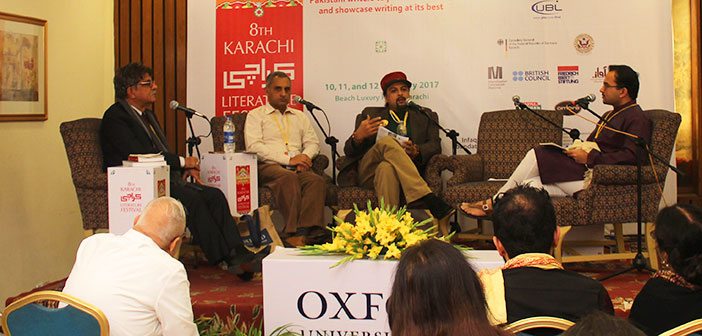
Yousuf Kerai (Right)
A session portraying various transitions in musical history was also conducted. Moderated by Arshad Mahmud, the session featured panelists including Yousuf Kerai, Lecturer at HU’s School of Science and Engineering, along with celebrities such as Zoe Viccaji, Taimur Rahman, Tina Sani, and Saif Samejo.
Urdu at KLF
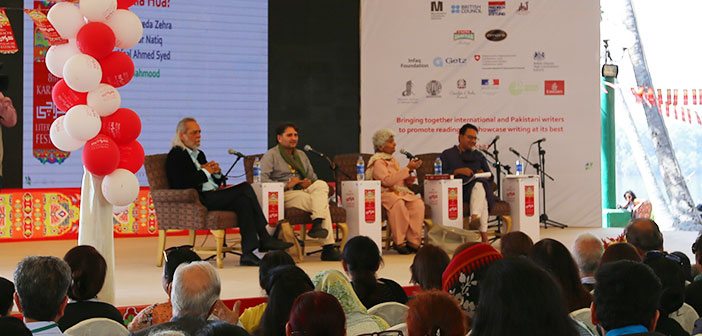
Afzal Ahmed Syed (Left)
Inamullah Nadeem, Lecturer at HU’s Arzu Center for Vernacular Languages moderated a session called “Nayee Bastian, Jani Pehchani Awazain”, which featured three women poets; Nasim Syed, Shahida Hassan, and Humera Rahman. Inamullah Nadeem and Afzal Ahmed Syed, Associate Professor at HU’s Arzu Center, were also part of a “Mushaira” session.
Book Launches
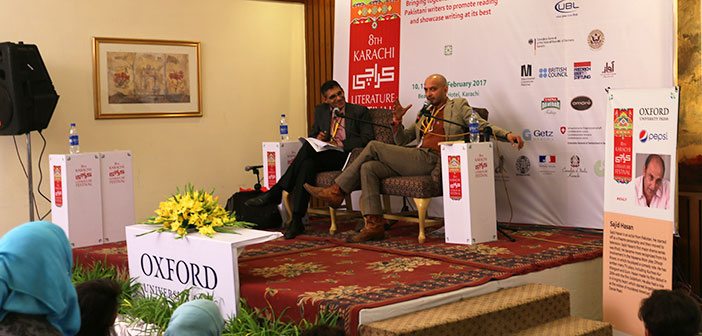
Dr. Framji Minwalla (Left)
Several book launches were also held during KLF, some of which were moderated by HU community members including Dr. Framji Minwalla, and Sibtain Naqvi, Senior Manager of Development and Public Relations. These included the books titled “Daddy’s Boy” by Shandana Minhas, and “Sadequain and the Culture of Enlightenment” by Akbar Naqvi.
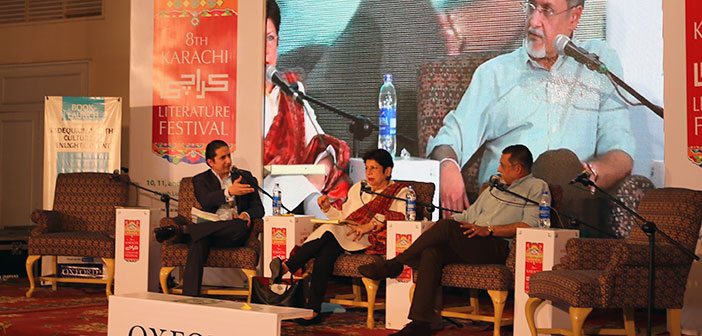
Sibtain Naqvi (Left)
Dr. Framji Minwalla also moderated a session during which the sneak preview of “The Selected Works of Abdullah the Cossack” by H.M. Naqvi was presented.
The best bit at this year’s literature festival for Habib University was the launch of Dr. Sabyn Javeri’s debut novel titled, “Nobody Killed Her.” Currently working as an Assistant Professor in Communication & Design at HU, Dr. Javeri has been known for her works of fiction being published in The Oxonian Review, The London Magazine, The South Asian Review, Bengal Lights, Wasafiri, World Audience, Trespass and Sugar Mule, amongst others.
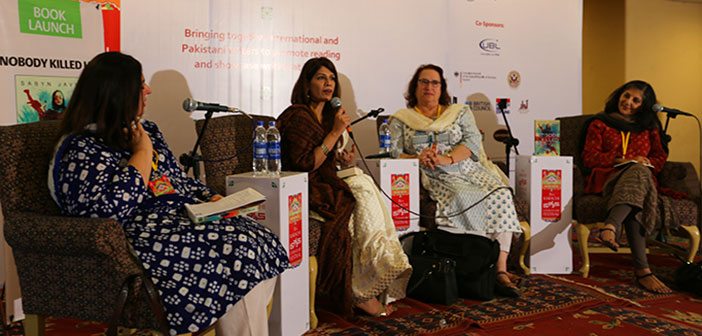
Dr. Sabyn Javeri (2nd From Left)
A captivating political thriller based on the assassination of a female Muslim leader, “Nobody Killed Her” was launched during a session being conducted by Anita M. Weiss, a University of Oregon professor, while Ayesha Tammy Haq and Maniza Naqvi also joined in the conversation.
Whether or not the story was inspired by strong empowered women like Benazir Bhutto largely remained the main point of discussion throughout the session.
Speaking about the motivation behind writing this novel, Dr. Javeri told the audience, “The whole point of writing this book was just an exercise in creating something fun without the pressure of publishing. I just really wanted to write an entertaining book – a page turner. My motivation for writing this novel was a woman who struggles through the power circle defying the concept of a suitable girl.”
“One thing that I find interesting about the novel is that when you start reading it, you sort of think that you know what the novel is all about but then as the novel proceeds you realize that it’s talking about things that you do not know,” commented Weiss while sharing her opinion about the book.
Icing on the Cake!
Huffington Post has acknowledged “Nobody Killed Her” as one of the novels that booklovers cannot wait to read this year.
Apart from HU faculty engagements, HU students also showed great interest in the festival by actively attending various sessions and readings at the event. In short, the 8th Karachi Literature Festival turned out to be a thrilling experience for ones who share love of the written word.

